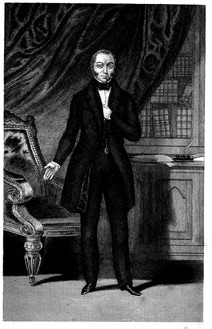Chartist leader

Known as the ‘Lion of Freedom,’ Feargus O’Connor was a much loved leader of the Chartist Movement. He held peoples' affection to such an extent that 50,000 people attended his funeral. In death, like in life, O'Connor had a magnetism that transcended his politics.
Feargus O’Connor was a Protestant who was born in Ireland. He became an MP for Cork in 1833 and campaigned to end the Act of Union. He supported the granting of full political rights to Catholics and tackled issues that divided society. However, in 1835, O’Connor was removed from office for failing to meet the property requirements of being an MP. This galvanised his ideology on Chartism. Moving to England, O’Connor stood in Oldham, but failed to get elected. Extra-parliamentary campaigning and advocacy began. He fought for annual parliaments, voting rights for all men and the abolition of the property qualifications for holding office. To further his cause, he established the Northern Star newspaper. Its readership of 48,000 a week by the end of the 1830s underlined his success.
Laying roots in Leeds, O’Connor toured the country; he spoke to huge rallies of the working classes and agitated for political freedoms. O’Connor did not mince his words. He spoke about the potential need for violence to achieve Chartism’s political goals. Political radicalism was a serious threat in the eyes of the state and the repression of working class protests bred riots in places like Oldham. Chartist leaders were angered by O’Connor and saw his language as both unhelpful and dangerous. Before O'Connor, the movement advocated for a moral rather than physical force. After him, the movement split. In 1842, the arguments for physical force in the Chartist movement were dominant. The previous leaders of Chartism stood down.
O’Connor advocated for land plans and his vision was to provide the working class with land by dividing large estates. He believed this would transform society, managing to raise £100,000 by 1847. With this, he purchased land in Gloucestershire. He called this land ‘O’Connorville.’ By 1850, the company in charge of the estate was bankrupt and those who settled on it evicted. In his last years, the 'Lion of Freedom' fell into disrepute. Chartism was failing to achieve its goals and O’Connor’s reputation became damaged. He suffered mental health issues and became confined to asylum. Despite his failings, his desire for huge political change bore fruits in the following century.
Feargus O’Connor was a Protestant who was born in Ireland. He became an MP for Cork in 1833 and campaigned to end the Act of Union. He supported the granting of full political rights to Catholics and tackled issues that divided society. However, in 1835, O’Connor was removed from office for failing to meet the property requirements of being an MP. This galvanised his ideology on Chartism. Moving to England, O’Connor stood in Oldham, but failed to get elected. Extra-parliamentary campaigning and advocacy began. He fought for annual parliaments, voting rights for all men and the abolition of the property qualifications for holding office. To further his cause, he established the Northern Star newspaper. Its readership of 48,000 a week by the end of the 1830s underlined his success.
Laying roots in Leeds, O’Connor toured the country; he spoke to huge rallies of the working classes and agitated for political freedoms. O’Connor did not mince his words. He spoke about the potential need for violence to achieve Chartism’s political goals. Political radicalism was a serious threat in the eyes of the state and the repression of working class protests bred riots in places like Oldham. Chartist leaders were angered by O’Connor and saw his language as both unhelpful and dangerous. Before O'Connor, the movement advocated for a moral rather than physical force. After him, the movement split. In 1842, the arguments for physical force in the Chartist movement were dominant. The previous leaders of Chartism stood down.
O’Connor advocated for land plans and his vision was to provide the working class with land by dividing large estates. He believed this would transform society, managing to raise £100,000 by 1847. With this, he purchased land in Gloucestershire. He called this land ‘O’Connorville.’ By 1850, the company in charge of the estate was bankrupt and those who settled on it evicted. In his last years, the 'Lion of Freedom' fell into disrepute. Chartism was failing to achieve its goals and O’Connor’s reputation became damaged. He suffered mental health issues and became confined to asylum. Despite his failings, his desire for huge political change bore fruits in the following century.

